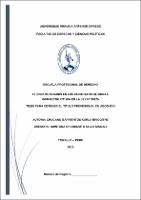Mostrar el registro sencillo del ítem
El dispute boards en los contratos de obra e Infraestructura en la ley Nº30225
| dc.contributor.advisor | Quintana Chuquizuta Silvia Magali | |
| dc.contributor.author | Chocano Barrientos, Karla Briggthe | |
| dc.creator | Chocano Barrientos, Karla Briggthe | |
| dc.date.accessioned | 2016-10-20T15:45:13Z | |
| dc.date.available | 2016-10-20T15:45:13Z | |
| dc.date.issued | 2016 | |
| dc.identifier | T_DERE_300 | |
| dc.identifier.uri | https://hdl.handle.net/20.500.12759/1978 | |
| dc.description.abstract | La presente tesis tiene como propósito, demostrar que el Dispute Boards, como mecanismo alternativo de resolución de controversias, contribuye en la ejecución de los contratos de obra e infraestructura dentro del marco de la Nueva Ley de Contrataciones del Estado, en nuestro país. Para ello, se han utilizado técnicas como el fichaje, recolección de información y análisis del contenido; con la finalidad de analizar de manera precisa la doctrina y legislación correspondiente a la materia de investigación. El objetivo de esta investigación es determinar, como este mecanismo alternativo de resolución de controversias, contribuye en la ejecución de los contratos de obra e infraestructura dentro del marco de la Nueva Ley de Contrataciones del Estado, otorgando Celeridad a la solución de controversias, evitando la paralización de obras en el Perú. Para esto, se ha recurrido a la Ley N° 30225 y su Reglamento, para efectos de realizar la interpretación de las normas legales, determinando de manera precisa las conclusiones y recomendaciones de la investigación. Con los resultados obtenidos de la presente investigación, se ha podido concluir que; la incorporación y regulación del Dispute Boards, como mecanismo alternativo de resolución de controversias en la Nueva Ley de Contrataciones del Estado – Ley N° 30225, contribuye favorablemente en la ejecución de los contratos de obra e infraestructura, en la medida que garantiza la continuidad de la obra mientras se resuelven las controversias y desavenencias surgidas. | es_PE |
| dc.description.abstract | This research aims to demonstrate that the Dispute Boards, as an alternative mechanism for dispute resolution, contributes to the execution of works contracts and infrastructure within the framework of the new Law on Government Procurement, in our country. To do this, they have used techniques such as signing, data collection and content analysis; in order to analyze accurately the doctrine and corresponding to research legislation. The objective of this research is to determine, as this alternative mechanism for dispute resolution contributes to the execution of works contracts and infrastructure within the framework of the new Law on Government Procurement, giving Celerity to the dispute, avoiding paralyzation of works in Peru. For this, it has resorted to Law No. 30225 and its implementing regulations, for purposes of making the interpretation of legal rules, determining precisely the conclusions and recommendations of the investigation. With the results of this investigation, it has been concluded that; the incorporation and regulation of Dispute Boards, as an alternative mechanism for dispute resolution in the New Law on Government Procurement - Law No. 30225, contributes favorably in the execution of construction contracts and infrastructure, to the extent that guarantees the continuity of the work while disputes and disagreement arising are resolved. | en_US |
| dc.description.uri | Tesis | |
| dc.format | application/pdf | es_PE |
| dc.language.iso | spa | es_PE |
| dc.publisher | Universidad Privada Antenor Orrego - UPAO | es_PE |
| dc.rights | info:eu-repo/semantics/openAccess | es_PE |
| dc.source | Universidad Privada Antenor Orrego | es_PE |
| dc.source | Repositorio institucional - UPAO | es_PE |
| dc.subject | Contratos | es_PE |
| dc.subject | Boards | es_PE |
| dc.title | El dispute boards en los contratos de obra e Infraestructura en la ley Nº30225 | es_PE |
| dc.type | info:eu-repo/semantics/bachelorThesis | es_PE |
| thesis.degree.level | Titulo Profesional | es_PE |
| thesis.degree.grantor | Universidad Privada Antenor Orrego. Facultad de Derecho y Ciencias Políticas | es_PE |
| thesis.degree.name | Abogada | es_PE |
| thesis.degree.discipline | Derecho | es_PE |
Ficheros en el ítem
Este ítem aparece en la(s) siguiente(s) colección(es)
-
Derecho [428]

